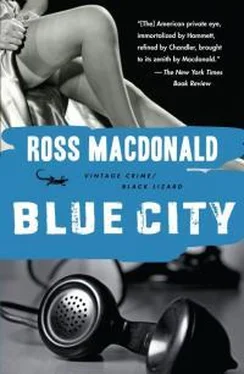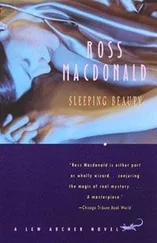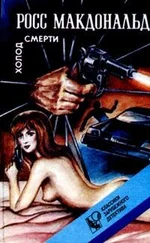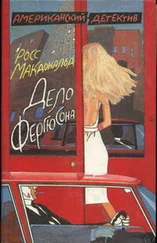“But somebody pays your salary, which I trust is large.”
“Who are you? I don’t like your tone.”
“Excuse me, I flunked out of the Juilliard School. But I was just asking for a little information in my crude way.”
“Mrs. Weather owns the station, of course.”
The big voice from the loudspeaker intoned: “That is my advice to you, Fearful One. Rear the child yourself. Bring up the little one in the ways of righteousness, and strive mightily to sustain yourself in worthiness for the noble career of motherhood. If you desire further advice and comfort from the seventh son of a seventh son, come to me in my office any day this week. Hours from ten in the morning till five in the afternoon.”
I said loudly: “Mrs. Weather died five years ago.”
“Please don’t shout,” the program director said. “Our soundproofing isn’t very good. You must be thinking of somebody else. I saw Mrs. Weather this afternoon, and she was in perfect health.”
“Did J.D. Weather marry again?”
“That’s true, I did hear Mr. Weather had been married before. He remarried a few months before his death.”
“Is she running the hotel, too?”
“As a matter of fact, she isn’t. It was sold to Mr. Sanford.”
“The rubber-company Sanford?”
“Right.”
“He still lives in that big house on the north side, doesn’t he?”
“That’s right. Now you’ll have to excuse me.” He trotted silently across the carpet to the door of the broadcasting chamber.
The loudspeaker was saying: “A genuine herbal remedy, prepared according to the exact and exotic formula of an ancient Oriental savant. This priceless medicine will cure or alleviate ailments of the heart, blood, stomach, liver, and kidneys. It is helpful in treating diseases of both men and women, and acts as a rare tonic in cases of depleted energy and low spirits generally. Just mail a dollar, plus a nominal fee of ten cents for wrapping, to this station, and get your large introductory bottle of Novena.”
The little man in the swallow-tailed coat moved away from the microphone to the door, and the program director took his place. “You have just been listening to Professor Salamander, seventh son of a seventh son and purveyor of age-old wisdom.” As the announcement continued, a record player played a few bars of the “Barcarolle.” Then the program director announced a half-hour of “Jazztime,” and began to create atmosphere with his voice.
I didn’t like the atmosphere created by his voice, and I went away. Professor Salamander and I rode the same elevator down. His eyeballs were yellow. He smelt strongly of whisky. He muttered to himself.
I had been there once or twice with my father, but I remembered the location of Mr. Sanford’s house only vaguely, so I took a taxi.
“You want me to let you off at the service entrance?” the driver said when we got there.
“Drive me up to the front door. I haven’t got anything to sell. And wait for me. I won’t be long.”
The house, which had been built by Mr. Sanford’s father, was a rambling white brick building with eighteen or twenty rooms. A grandiose and useless tower at each end of the façade gave it a feudal touch. Its grounds occupied a city block, and included a sunken garden, tennis courts, and a swimming pool, which kept Alonzo Sanford and his friends off the streets. Only when a strong and steady south wind was blowing, did the odor of the rubber factories reach Mr. Sanford’s front yard.
A Negro maid in white collar and cap answered the door-bell.
“Is Mr. Sanford home?”
“I’m not sure. Who shall I say is calling, please?”
“Tell him John Weather. J.D. Weather’s son.”
She let me in and left me on a chair in the vestibule, holding my hat on my knees. After a moment she returned and took my hat. “Mr. Sanford will see you in the library.”
When I came in, Mr. Sanford put down his open book on the wide arm of his chair and marked his place with his reading glasses. He didn’t look ten years older, but I noticed that when he got up he leaned forward over his knees and pushed with his arms as well as his legs. He had on a silk lounging robe with a red velvet collar. He came towards me with his hand outstretched.
His face had thinned and dried, so that his smile was like carefully folded paper. “Johnny Weather, I do declare! This really calls for a drink. You look big enough to have a drink.” He chuckled paternally.
“Maybe a short lemonade. I’m awfully big for my age.”
He smiled again with all his scrupulously matched teeth. “Now let me see, what would your age be? I know I should be able to tell you, but when you’re my age you don’t number the years with such painstaking accuracy. Twenty or twenty-one?”
“Twenty-two,” I said. “Old enough to inherit property.”
He said: “Excuse me,” rang the bell for the maid, and asked for drinks.
“Won’t you please sit down? There, that’s better. Believe me, I can understand a little bitterness on your part, Johnny. From your point of view it was sheer bad luck that your father remarried a few months before his unfortunate – demise.”
“Who did he marry? Who killed him?”
“Do you mean to say you’ve never met your stepmother?”
“I never even heard of her before tonight. She’s a stranger to me. There seems to have been practically a hundred per cent turnover in this town.”
“I’m sure you’ll find her quite a charming young woman. I’ve had relations with her on several occasions, business and otherwise, and I’ve found her consistently charming.”
“How nice for both of you! I hear she sold you the hotel.”
“As a matter of fact, she did. Mrs. Weather, and her business agent, Mr. Kerch, decided to cut down a bit on her holdings in real property. And I’ve had no reason to regret the investment.”
“It’s funny to hear you call this woman Mrs. Weather. My mother died five years ago.”
“Yes, yes,” said Mr. Sanford. “Most unfortunate.”
The maid brought brandy highballs, and Mr. Sanford lit a cigar. “Your father tried to find you, you know,” he went on. “What in the world happened to you, Johnny?”
“I moved around. I didn’t like my father at that time, and I promised my mother I wouldn’t go back to him. I lived in various parts of the country for a couple of years, and then the draft got me. The last year or two I’ve felt different about my father.”
“Of course. It’s hard to think ill of the dead.”
“That’s not the point. You see, I didn’t know he was dead until tonight.”
“You mean to say you weren’t informed?”
“When was he killed?”
“Nearly two years ago. April of 1944, I believe it was.”
“I was in England then. Nobody went to the trouble of letting me know.”
“That is a crying shame.”
“Who killed him?”
“The crime was never solved. We all did what we could. You must know that your father and I were quite close at one time. His death was a rude shock to me.”
“It got you the Weather House. There can’t be much of the town you don’t own by now.”
He sipped his highball and looked at me coldly over the rim of the glass. “As I said before, I can understand your being a little bitter, Johnny, inasmuch as your father’s will cut you off without a cent. Still, I think it’s unwise of you to insult your potential friends. I was prepared to be quite sympathetic towards you.”
“Your sympathy isn’t negotiable. It didn’t do my father much good. And your little threat isn’t very frightening. You can’t browbeat me with money till I come asking you for something.”
He leaned forward and his pale old eyes gave me a blank stare that tried to look candid. “You seem to have gotten some very strange notions into your head. I was under the impression that you came to me as an old friend of your father’s.” He paused and examined my unpolished field boots and my unpressed clothes. “Perhaps with some idea of asking me for assistance.”
Читать дальше








